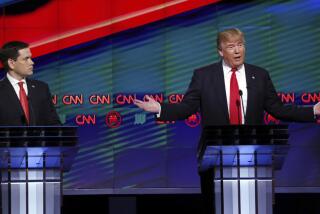The Generalist Vs. the Ideologue : Bush’s Blank Slate May Be His Ace Against Dukakis’ State-of-the-Art Liberalism
- Share via
It is a presidential campaign in which the issues struggle in vain for space on the front pages of newspapers. When the campaign has managed to muscle its way to the topof news editors’ agenda, it has usually been by way of a gaffe or a scandal. So desperate have reporters been for any shred of substance that they have begun combingthe two candidates’ statements for novel interpretations with the solemn intensity that we normally associate with theologians.
The latest exegetic scoop came last Friday in the New York Times’ lead story, which characterized Bush as newly cautious on the question of deploying the “Star Wars” strategic missile defense system. Bush said that deployment should wait until gains in scientific research justified the expense, and that even partial deployment would depend on whether “I can get convinced by the experts” that a “guardian shield” would work. Democratic candidate Michael Dukakis pounced on the news, expressing malicious delight at the vice president’s apparent conversion to a more dovish position.
The episode might be written off as a case of the press trying to squeeze some juice out of a desiccated campaign. But there is more to it than that. After 7 1/2 years of deferential suffocation in the vice presidency, Bush has 2 1/2 months to articulate a philosophy of governance that sounds as if it is his own. But Bush’s pontificating in the Times interview was not much of a refutation of Dukakis’ barb (in Time magazine) that the vice president is “pretty much a blank slate.”
Bush is indeed improvisational in his political canons. He makes perfunctory claims to being a conservative, and quickly passes on to other matters. He has tended to grope his way through the warehouse of ideas, choosing some that are characteristically conservative and embracing others less distinctively so.
This puts Bush in good company. Most of our successful presidential candidates have not leaned either so heavily or so consistently on a political philosophy that they could not ditch any or all of its hallowed dogmas if expediency dictated it. Even so thoroughgoing a believer in small government as Thomas Jefferson, when confronted with the tantalizing prospect of snapping up the Louisiana territory at a bargain price, forked over the people’s money to Napoleon with a breezy justification.
Most candidates carry very light philosophical baggage to the door of the White House. During the 1932 campaign Franklin Roosevelt assailed the very fiscal theory thathe was later to embrace and enshrine. So imperfectly formed were Dwight Eisenhower’s political ideas that he did not declare himself a Republican until after he had come under active discussion as a candidate. Ronald Reagan notwithstanding, Americans have generally felt more comfortable with a candidate not anchored too firmly to an ideology.
This reasoning may underlie both Bush’s own philosophical indeterminacy and his campaign’s effort to depict Dukakis as a catechized liberal. Better a blank slate, the reasoning goes, than one on which unsettling doctrines are writ large.
The Dukakis campaign’s charge that Bush has yet to define himself sticks to the vice president with the tenacity of Velcro. But what about the Bush campaign’s effort to stitch the scarlet L to Dukakis’ shirt?
Dukakis is most assuredly a liberal, but of a sort that would be almost unfathomable to such great liberals of the past as Hubert Humphrey. Dukakis’ is the denatured liberalism of the late 1970s, the period in which the then-former governor was in political exile at the Kennedy School of Government at Harvard. It is a liberalism cut to fit periods of austerity, and is based not on open-handed largess by the government but on Washington’s taking a role as a catalyst of economic development in conjunction with labor and management.
The innovation of this movement is an approach to economic problems known as “industrial policy.” Ironically, one of the great congressional exponents of the approach is Rep. Richard Gephardt, who lost out to Dukakis in the primaries. Gephardt scrapped industrial policy, to which he was intellectually attracted, in favor of its liberal opposite, populism, adopting the slogan, “It’s your fight, too!” Industrial policy is not about fights. It is as far from the sweat-stained, horny-handed workplace democracy with its overtones of class struggle as it is from totem-pole worship.
What makes Dukakis a liberal, and a devout one, is the role that he accords government in reviving dying basic industries and encouraging new and promising ones. While liberals of Dukakis’ persuasion shun the word planning because it conjures up images of commissars in mohair coats telling peasants where to plant sugar beets, they assign an important strategic role to the state. Under it all is a secret envy for the orderliness and efficiency of Japanese society and the smooth cooperation there among labor, industry and government.
Nothing in the vice president’s intellectual repertoire approaches in completeness his rival’s state-of-the-art liberalism. And as the political campaign shifts into high gear, we see George Bush, heir to the most ideological President in the 20th Century, as a man innocent of any ideology. Far from being incapacitating, Bush’s philosophical minimalism may help him as he vies for the votes of an electorate that has usually been uncomfortable with doctrinaire politicians.
More to Read
Get the L.A. Times Politics newsletter
Deeply reported insights into legislation, politics and policy from Sacramento, Washington and beyond. In your inbox twice per week.
You may occasionally receive promotional content from the Los Angeles Times.










